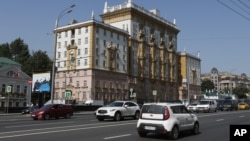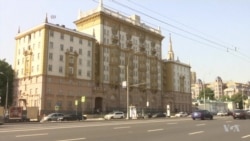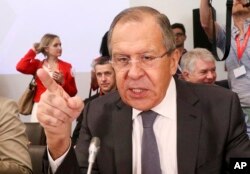The United States will halt the issuing of all non-immigrant visas from Russia from Wednesday to September 1, according to the U.S. Embassy in Moscow.
The embassy says the move is due to the "Russian government-imposed cap" on its staff levels, according to a fact sheet on the U.S. Embassy's website.
"All non-immigrant visa operations across Russia will be suspended on August 23," it said. Visa issuing resumes September 1 — but only at the U.S. Embassy in Moscow. Consulates in St. Petersburg, Vladivostok and Yekaterinburg will stay frozen for as long as staffing levels are reduced, it read.
The statement said all scheduled appointments for non-immigrant visas would be canceled.
Watch: US Embassy in Russia Suspends Nonimmigrant Visas Because of Staff Cap
Frustration
Russians outside the U.S. Embassy in Moscow voiced frustration Monday with the ban, citing the effect on travelers to the U.S. for tourism, business and education.
"I am very negative about it," said a radio announcer who gave just his first name — Stepan. "Unfortunately, one of my friends was supposed to have an interview on August 24th in Yekaterinburg and she won't get a visa now."
Stepan said Russia's expulsion of U.S. Embassy staff was "out of place" and making things worse for visa applicants.
Others noted that ordinary Russians bore the brunt from the dispute. As many as 200,000 Russians apply for non-immigrant visas to the U.S. annually.
"It is very silly. I think it so silly!" said a doctor who also gave only her first name — Inna. "Why should the people suffer because of something happening between our states?"
Russia response
Russia's Foreign Minister Sergey Lavrov claimed the suspension attempts to stir discontent among Russians over the actions of the Russian authorities.
"It is a well-known logic," Lavrov said, answering a question at a joint press conference in Moscow with his Egyptian counterpart. "And this is the logic of those who organize color revolutions, and it is clearly inertia from the [President Barack] Obama administration.
"As for our response, like I already said, it is necessary to thoroughly study the decisions announced by the American side today. We will see ... I can say only one thing — we will not take it out on American citizens," Lavrov said.
In July, Russia retaliated against U.S. sanctions by expelling U.S. Embassy staff from diplomatic property and demanding their numbers be reduced from 755 to 455 by the end of August.
However, hundreds of Russian citizens employed at the U.S. Embassy are expected to account for most of the lost jobs.
U.S. officials have said the administration plans to announce its own retaliation after September 1.
A series of U.S. sanctions followed Russia's 2014 military interference in Ukraine, including the annexation of Crimea. Russia's hopes for improved relations, and weakened sanctions, under the administration of President Donald Trump have been dashed since Trump took a tougher line at a July speech in Poland. Trump also reluctantly signed onto tighter sanctions against Moscow over alleged Russian spying and meddling in the 2016 U.S. presidential election.
VOA's Olga Pavlova contributed to this report.







